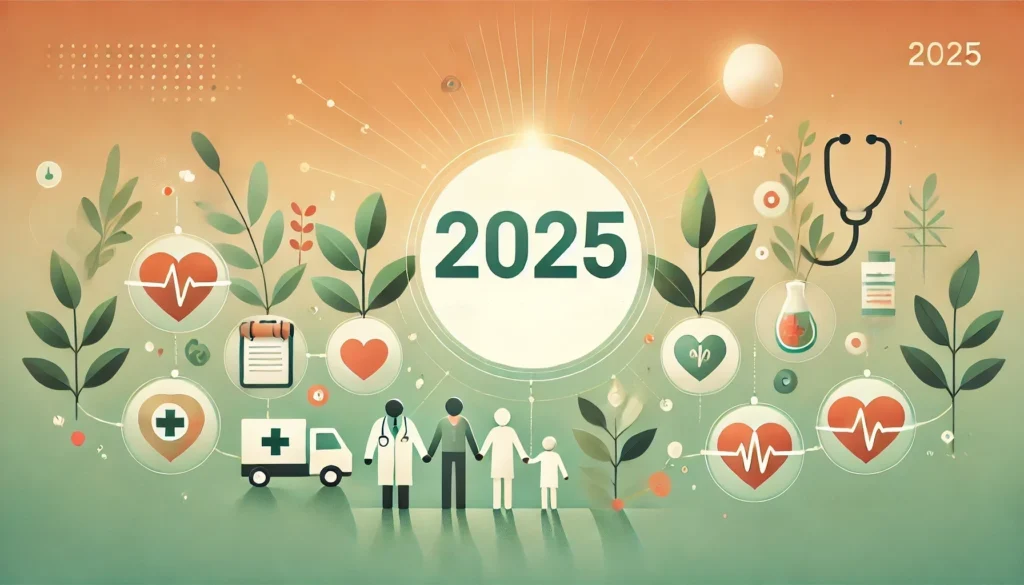
As 2024 draws to a close, the healthcare industry is preparing for another year of significant change. Driven by new technologies, shifting patient expectations, and insights gained from global health challenges, 2025 promises to reshape how care is delivered and experienced. Advancements like artificial intelligence (AI), personalized treatments, and preventive care are making healthcare more efficient, accessible, and tailored to individual needs. Here’s a closer look at the key trends set to impact patients, providers, and the healthcare system as a whole in the year ahead.
Artificial Intelligence and Automation in Healthcare
AI is transforming healthcare by improving diagnostics, streamlining workflows, and personalizing patient care. These innovations will continue to evolve in 2025, introducing new opportunities and ethical questions.
Key Developments:
- AI in Diagnostics: AI-powered tools are excelling in early detection of conditions like cancer and cardiovascular diseases, analyzing medical images faster and more accurately than traditional methods.
- Administrative Automation: Hospitals are using AI to handle scheduling, billing, and patient intake, reducing administrative burdens and improving efficiency.
- AI in Drug Discovery: Pharmaceutical companies are leveraging AI to accelerate drug development, repurpose existing medications, and optimize clinical trials.
What to Watch in 2025:
- Telehealth Integration: AI tools will enhance virtual care by triaging patients and suggesting treatment plans.
- Ethics and Regulation: Policies on data privacy and the fairness of AI algorithms will be key areas of focus.
Expansion of Telehealth and Virtual Care
Telehealth, once a necessity during the pandemic, has become a core component of modern healthcare. In 2025, hybrid care models and specialized telemedicine will continue to grow, offering patients more options and flexibility.
Key Developments:
- Hybrid Care Models: Healthcare providers are combining in-person and virtual consultations to deliver seamless, patient-centric care.
- Specialized Telemedicine: Virtual care is expanding in areas like mental health, dermatology, and chronic disease management, improving access for underserved populations.
- Remote Patient Monitoring: Wearable devices are enabling real-time health tracking, empowering patients to manage their conditions proactively.
What to Watch in 2025:
- EHR Integration: Telehealth platforms will increasingly integrate with electronic health records to improve continuity of care.
- Policy Changes: Expect new regulations to expand telehealth reimbursement and accessibility.
- Patient Trust: Providers will focus on enhancing user experiences and addressing privacy concerns to build confidence in virtual care.
Rise of Personalized and Precision Medicine
Personalized medicine is moving healthcare away from a one-size-fits-all approach, tailoring treatments to individual genetic, environmental, and lifestyle factors. While many advancements are still on the horizon, 2025 will bring meaningful progress.
Key Developments:
- Genomics: Technologies like CRISPR are enabling targeted therapies for genetic conditions and certain cancers.
- Biomarker-Based Treatments: Biomarkers are helping predict patient responses to medications, improving outcomes.
- Customized Care Plans: AI and big data are creating individualized strategies for managing complex conditions.
What to Watch in 2025:
- Expanded Clinical Trials: Expect to see more trials exploring genetic editing and biomarker-based therapies.
- Affordability Initiatives: Efforts to reduce costs will aim to make personalized treatments more accessible.
- Regulatory Progress: Governments will focus on data privacy and ethical concerns in precision medicine.
Emphasis on Preventive Healthcare
Preventive care is becoming a cornerstone of modern healthcare, with a focus on maintaining wellness rather than treating illnesses after they arise. This shift is set to accelerate in 2025.
Key Developments:
- Wearable Technology: Smartwatches and fitness trackers are empowering patients with real-time health insights, enabling early interventions.
- Lifestyle Medicine: Programs promoting healthy habits like nutrition, exercise, and stress management are becoming standard in care delivery.
- Health Literacy: Providers are educating patients to make informed decisions about their health through digital tools and community initiatives.
What to Watch in 2025:
- Expanded Coverage: More insurers will cover preventive services like screenings and wearable devices.
- Workplace Wellness: Employers will adopt wellness programs to promote healthier lifestyles.
- Predictive Analytics: AI tools will identify at-risk populations, enabling targeted preventive measures.
Growth of Value-Based Care Models
Value-based care (VBC) is shifting the focus from service volume to patient outcomes, incentivizing providers to deliver high-quality, cost-effective care. This model will gain momentum in 2025.
Key Developments:
- Bundled Payments: Providers will receive single payments for entire treatment episodes, encouraging efficiency.
- Patient-Centered Care: Shared decision-making and personalized care will remain central to VBC initiatives.
- Social Determinants of Health (SDOH): Addressing factors like housing and income will improve outcomes for underserved populations.
What to Watch in 2025:
- Data Analytics: Tools for tracking outcomes and predicting risks will expand.
- Policy Support: Regulations will promote VBC adoption through financial incentives.
- Transition Challenges: Providers will need to navigate costs and infrastructure demands to move away from fee-for-service models.
Healthcare Workforce Evolution
The healthcare workforce is adapting to new challenges and technologies, with reskilling and innovation driving significant changes.
Key Developments:
- Upskilling: Professionals are being trained in areas like AI, telehealth, and genomics to stay ahead of industry advancements.
- Task Shifting: Non-clinical staff and automated systems are handling routine tasks, allowing clinicians to focus on patient care.
- Remote Roles: Telehealth and administrative roles are increasingly performed remotely, improving work-life balance.
What to Watch in 2025:
- Addressing Shortages: Recruitment and expanded training programs will help fill workforce gaps.
- AI-Assisted Training: Tools like VR simulations will offer personalized learning experiences for healthcare professionals.
- Diversity Initiatives: Policies supporting equitable hiring practices will remain a priority.
A Transformative Future for Healthcare
The trends shaping healthcare in 2025 promise to improve quality, efficiency, and accessibility for patients and providers alike. From AI-powered diagnostics to personalized medicine and preventive care, these advancements are creating a system that prioritizes outcomes over processes. As the industry continues to evolve, embracing these changes will be key to building a more patient-centered, equitable, and effective healthcare future.
